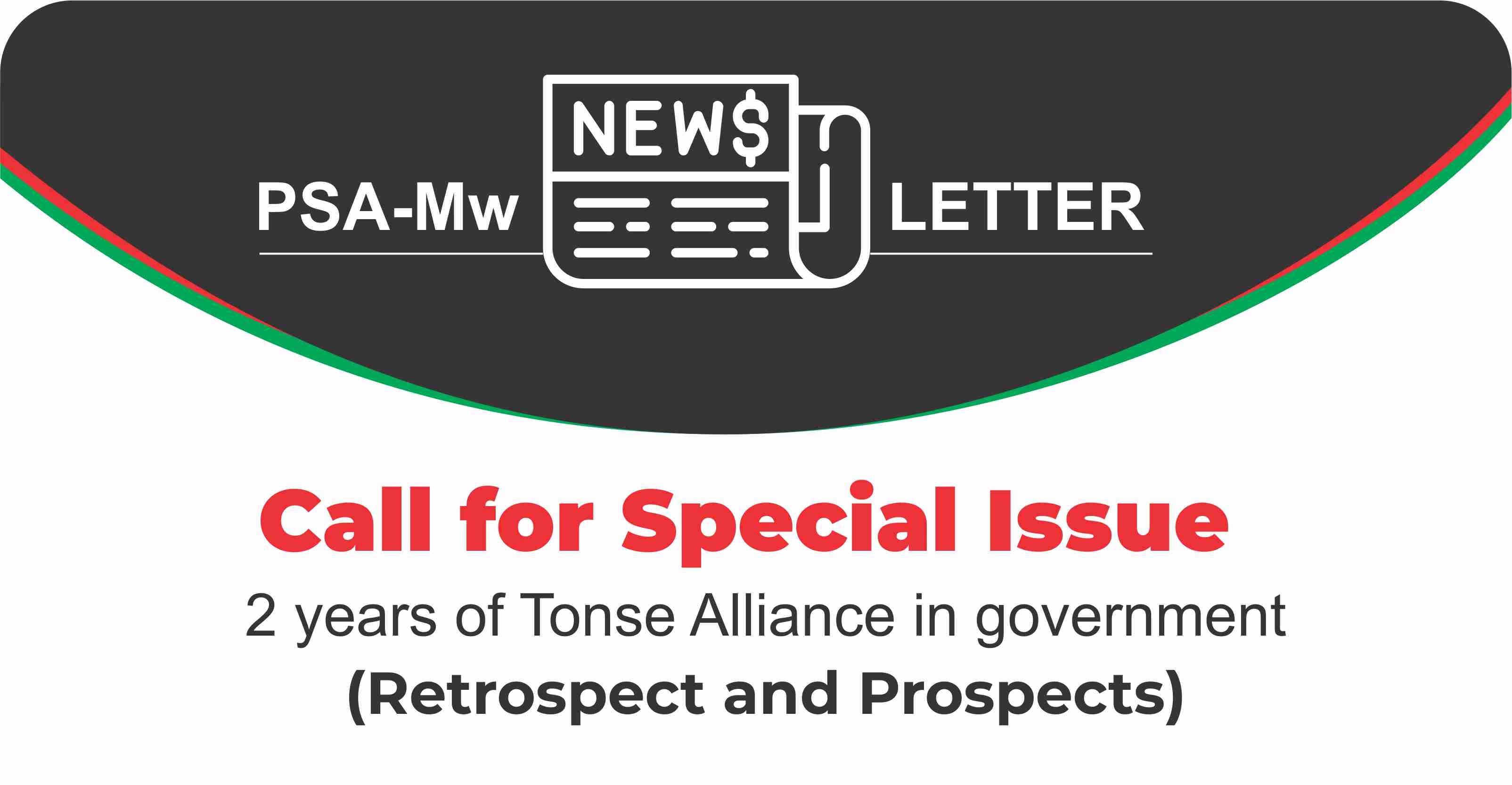
- Posted By Admin
- On 27 June
- Tag: Politics, Elections
Overview and Aim
PSA Newsletter is primarily owned and published by the PSA – Malawi. The aim of the Newsletter is to publish and disseminate high quality articles (non-academic but grounded on relevant analytical frameworks) on politics and public affairs and in the process promote informed discussions as well as debates. Ultimately it is expected that the newsletter will further assist in advancement of policy advocacy in Malawi and beyond. Thus, the Newsletter is essential as a valuable resource for political science and public affairs professionals in the private and public sector institutions. With the exception of Special editions, the Newsletter will be published biannually in June and December every year.
Call for Special Issue
The Editors of PSA Newsletter are inviting Articles for a special issue of the Newsletter to be published by early July 2022. This special issue is entitled: “A reflection of the State of democracy, governance, and politics in Malawi on the occasion of 2 years of Tonse Alliance in government – Retrospect and Prospects”. Malawi held presidential elections on 23rd June 2020 following the annulment of the May 2019 presidential elections results in which the-then incumbent Peter Mutharika of the Democratic Progressive Party was declared the winner. Opposition leader Lazarus Chakwera of the Malawi Congress Party (but heading the electoral Tonse Alliance composed of 9 parties including the MCP, UTM, AFORD, PPM, Umodzi Party, MAFUNDE, Peoples Party, PETRA, and Freedom Party) emerged victorious in this Presential lections re-run when he got 59% of the votes. Chakwera was eventually sworn-in as President of Malawi on 28th June 2022. This presidential re-run was therefore very unique for many reasons which include: The court verdict that led to these elections set a milestone across African politics, for it made Malawi just the second country south of the Sahara to have presidential poll results annulled by the courts (after Kenya in 2017). But unlike the Kenyan case, the presidential re-run was won by an opposition leader. The said court ruling also had a significant impact on the Malawi presidential electoral system. Specifically, through the court’s interpretation of the Malawi constitution, June 2020 presidential elections witnessed the 50%+1 rule being applied for the first time. Another unique element was persistent and well-coordinated protests, against the May 2019 presidential elections results, with the army playing a key role to protect the protesters when the police failed to manage the situation. Equally important was the fact that the ushering of the new Tonse Alliance government provided a new wave of hope that the new regime would translate the campaign rhetoric of championing a transformational leadership in order to “clear the rubble” and “broken system”. On 28th June 2022, the Tonse Alliance government will have clocked exactly 2 years in office.
Purpose
To critically reflect on the state of democracy, governance, and politics in Malawi within 2 years of Tonse Alliance at the helm. What are the gains, losses, lessons and implications on politics, governance, and public affairs? What are the retrospects and prospects? Ultimately it is expected that the articles submitted will provide further insights into the implications of this state of democracy, governance, and politics for the past 2 years not only in Malawi but also in Africa and beyond. This Special edition will also highlight the recent achievements of individual members of the Association. The Newsletter will be published on the PSA website.On ly members of PSA will be eligible to submit articles to be considered for publishment under this Issue. Interested members are advised to contribute to any of the following sub-themes:
- Civil Society, civic space, NGO Accountability and human rights
- Coalition politics and governance & Intraparty politics and democracy.
- Covid-19, politics and democracy and Political leadership, governance and democracy
- National politics and chieftaincy: Relationship between the state, the ruling party on one hand and chiefs
- The Opposition and democracy & Parliament and democracy & Public sector reforms, democracy and governance
- Peace and security OR Corruption, OR Campaign promises Versus Action OR Gender, governance and politics. & Elections, politics and governance.
- Establish and foster closer relationship between political scientists and government officials, academic institutions, Civil Society, and the Media.
- Promote the study, research and publications related to but not limited to Malawi politics.
- Promote activities of associations of Political Science students in education institutions in Malawi.Members of Parliament & Candidates
Specifications
The articles should be within the word range of 700 to 1000 words. The articles must be analytical and must set out a brief analytical framework and proceed to deal with the issue. The deadline for submission of Articles is 30th June 2022, 12:00 midnight. All the articles will be published on this site and should be submitted to the following
snkowani@gmail.com raphaelfeiva@gmail.com.
Comments (2)
Add your comment:
Your email address will not be published. Required fields are marked *



